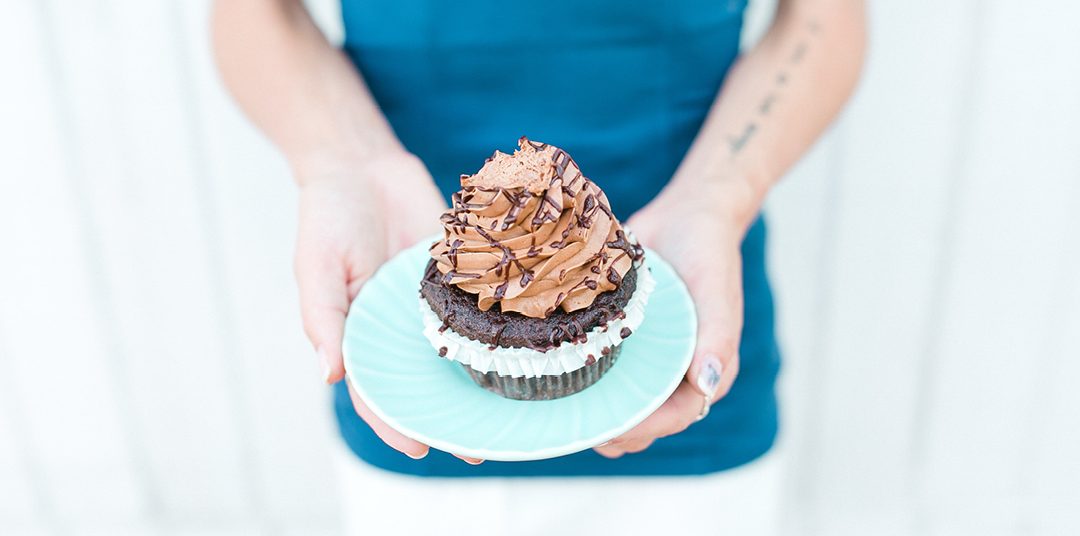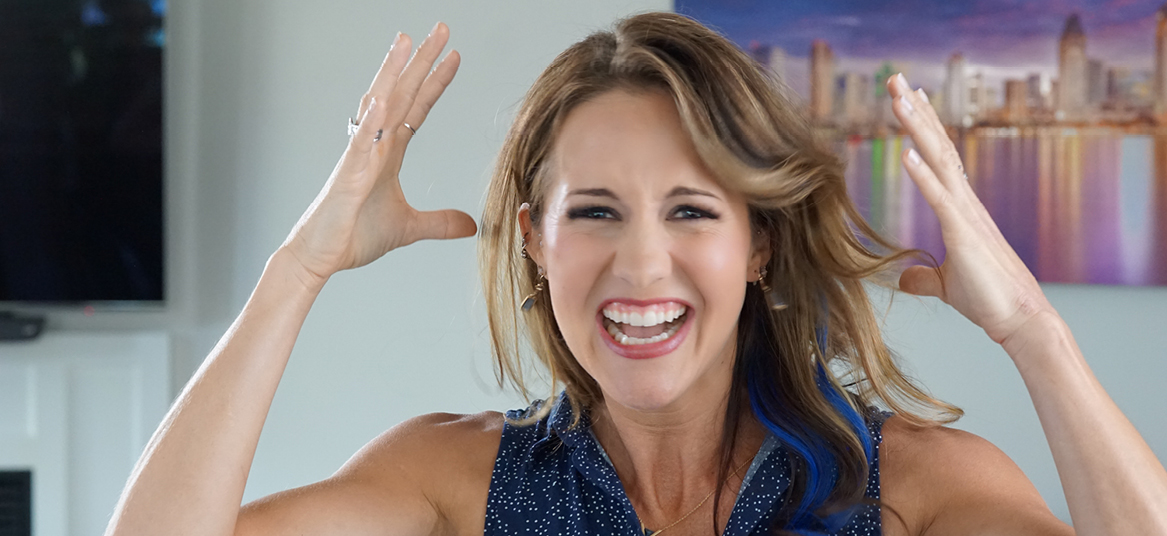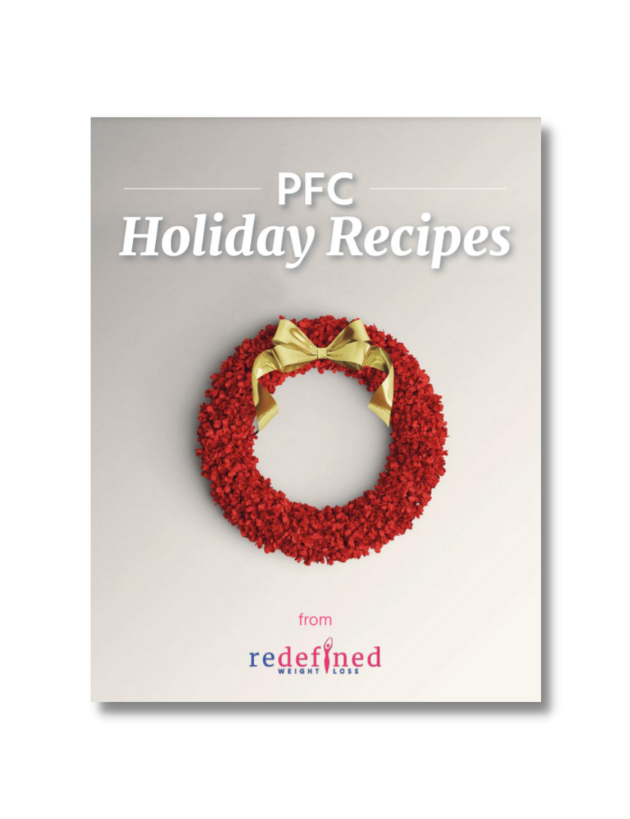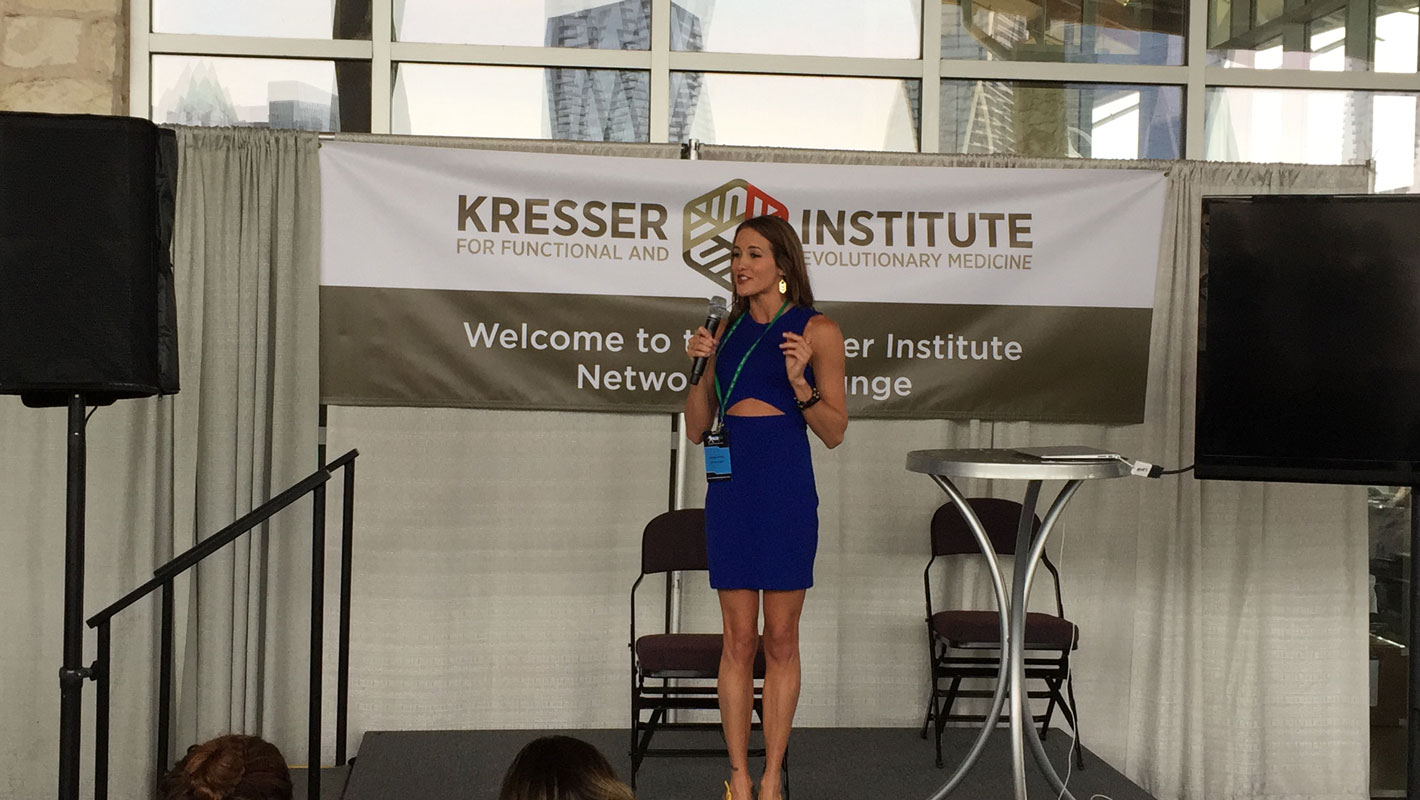Are you constantly thinking about where you’ll get your next sugar fix, your next “guilty pleasure” or “cheat?” Ever swore you were only going to “just have one,” and before you know it the entire box is gone? Or—and I know this was one of my big problems—have you made an excuse for why you NEED to get groceries at 10:00pm… knowing it’s really a Ben & Jerry’s run?
Are you trying to tune out that voice right now—the one telling you that you need another cookie, brownie, potato chip, or fill-in-the-blank-with-your-guilty-pleasure? Do you feel like your sugar cravings are holding you back from more than losing weight? Like peace of mind? Feeling like as if you can’t control yourself?
If you answered YES, you are not alone! Being sugar sensitive (or dare I say — addicted) is a reality for many people (myself included).
I get it. I struggled for far too long feeling ashamed, consuming my “drug of choice” behind closed doors. I can’t count the number of times I tried to “get clean.” Not from any drug—though its effects on my body were just as damaging. I felt like a junkie. I would try to abstain, but then I needed my fix. “Just a quick hit. Then I’ll feel better.”
But one hit—or bite—was never just one. Unlike those who are addicted to hard drugs, I was surrounded by my addiction. I could get it at any gas station, grocery store…heck, Amazon PrimeNow could even send me something in a mere matter of hours!! Any substance that had sugar pushed my body into a chemical frenzy. I felt so out of control. I was a will-less Pavlovian dog. One whiff, or even just the thought of it, and I salivated.
I felt so alone at the time, as though I was the only one suffering, but now I know I wasn’t. Perhaps you’ve felt this way, too? Thousands, maybe even millions, of us across the U.S. struggle with this, yet in our society, it’s either laughed off (because sugar’s pervasiveness has become commonplace and socially acceptable…even expected), or it’s hidden behind closed doors because of the shame that accompanies it.
You are not alone. Thousands of women have heard my story and then confessed to me their personal battle with this exact same issue. They tell me their most embarrassing moments—the great lengths to which sugar has driven them—and when they say it aloud for the first time ever, it’s always with tears of embarrassment and relief running down their face. Sugar controlled them, and they had been hiding it for so long.
One client told me that she locks herself out of the pantry and has her husband hide the key. Another leaves her credit cards at home so that she doesn’t “somehow” end up in the McDonald’s drive thru ordering ice cream.
Many have told me stories of throwing their indulgence into the garbage so they wouldn’t eat it, only to find themselves shamefully digging through that garbage just minutes later.
Women no longer want to be controlled by a white powdery substance that provides nothing but shame and pain.
Women are desperate to finally break this addicting cycle of embarrassment and frustration, of “giving” up sugar, then “giving in” and indulging again. Starting “clean” and throwing everything away on Monday, only to be back in the same self-defeated place on Wednesday (if not by Tuesday). Unsuccessful every time.
So often, we laugh our cravings off or make light of them, even though deep down the cravings are a real problem. This is a real struggle, and I am here to tell you that you can overcome it.
One big thing I want you to know right now is this: Sugar cravings have nothing to do with a lack of willpower, and everything to do with balancing your brain chemistry.
But before our biochemistry lesson, allow me to share with you one of my most embarrassing moments, EVER!
I share this story, because I’ve been there too. And this night stands out in my mind so strongly because it’s a night where I completely lost control…
When I was in school to be a Registered Dietitian, I was actually struggling with my sugar habit A LOT. It had gotten so out of hand that one evening I totally lost control.
My roommate had left for the evening. On her side of the room, there was a sealed plastic container of frosted cookies that she had just picked up from the grocery store.
I remember sitting alone in the room feeling like I was in a battle with this package of cookies. They were calling me! All 12 of them!
I was actually sweating a little bit and felt my heart racing as I tried to resist them. But in the end, I caved. And I shamefully grabbed the container and ate them. All of them. Twelve frosted cookies disappeared and I felt absolutely disgusting.
The next morning, it got worse. Because I had to confess to my roommate that I’d eaten her entire container of frosted sugar cookies.
Yep, the soon-to-be dietitian who couldn’t keep her hands off of some cookies. I felt like such a fraud.
And you know what? There were hundreds of similar moments. Like, intentionally buying “Halloween candy” in August. Hitting up McDonald’s for Shamrock Shakes in March. Downing Pumpkin Spice lattes at Starbucks in September.
I was trying to follow all the “dieting rules” I was learning in school. I tried countless “sugar detoxes.” But I kept caving. And putting on weight. And feeling more and more out of control.
The truth is—I was a sugar addict.
Yes, sugar addiction is a real thing. Sugar has the same effect on the brain as cocaine. It literally triggers the same reward centers as this powerful drug…so it’s no wonder why we can’t “just give it up.” It doesn’t work that way.
And I know, calling your compulsion to consume sugar an addiction probably sounds a bit dramatic, but let me explain. Addiction is defined as the continued use of a mood-altering substance or behavior despite adverse dependency consequences. When you are addicted to something, you keep exposing yourself to it—even when you know that it’s harming your health. And deep down, you know you can’t stop after just one, right?
The kicker for me was that the eating regimen I was learning in dietitian school (the low-fat, low-calorie diet) only added to the problem. It brought me to the unhealthiest point of my life, and my heaviest weight.
But here’s that good news again: kicking sugar addiction has nothing to do with willpower, and everything to do with balancing your brain chemistry.
That’s why I’ve become an expert on busting sugar addiction…and I’m excited to share my findings with you. 🙂
Now, if you are anxious about giving up sugar, I completely hear you. I remember when I thought it would be IMPOSSIBLE to cut sugar out of my life…or even cut back at all! The mere thought caused me anxiety (and caused me to reach for more sugar…). The fear is real and normal. Just like any addict would feel overwhelmed by the notion of going cold-turkey, a sugar addict is no different. There is good reason for it. We grow up with both physical and emotional attachments to this beast. It’s common to feel some major resistance to the idea of not having it as part of your daily routine…whether you’re celebrating, or crying, or looking for a pick-me-up when you’re exhausted. However, the sugar never really makes the celebration more meaningful. It never fixes the reason why you’re crying. It never is a true pick-me up because it means you’ll only be dropping to further depths in just a few short moments.
The good news is that you can live a sugar-free life. I know it sounds crazy, but it is possible. Now, here’s the even better news… You don’t even have to live completely sugar free! Unlike the heroin addict who can never have “just a little bit,” it can be possible for a sugar addict to not need to completely abstain from sugar. You can clean out your body’s system—and then, once your brain chemicals are balanced again, you will be able to enjoy the occasional indulgence, but this time without going off the deep end. Before we get you there, though, you must first understand how sugar behaves in the body, and then, how you can manage it.
I’m sure you already have your reasoning for wanting to give up sugar. Maybe it’s packed on some extra pounds (it packed on twenty for me), maybe it’s interfering with your ability to focus on work, kids, life or everything (my next “fix” was all I could think about…). Maybe it’s shooting your self-esteem and self-confidence all the way to the ground. Regardless of the reason, I’m so proud of you for being here and acknowledging that it’s an issue.
Sugar takes a toll on so many aspects of our life and health. Think of sugar as little shards of glass that are cutting up your insides, thus inflaming your body. And this happens even if you can’t feel it. It leads to weight gain and halts weight loss in a couple of ways. First, when you consume sugar in excess, it’s stored in your cells as fat, and second, when you have that sugar—those pieces of glass—inflaming your insides, it becomes a daily battle for your body until you give it a break. It focuses on putting this fire out before allowing you to lose weight. And sugar consumption affects a lot more than just your waistline, which you may already know. For a lot of my clients, it’s been the culprit behind migraine headaches, feeling bloated, tossing and turning at night, and feeling mentally foggy all day. It’s also caused relationship tension too.
Now, let’s dive into the science behind sugar cravings! Sugar cravings are a biochemical response in your brain. They are the response to one of two things—or both of them working together.
These are the real reasons you get cravings in the first place:
Reason #1: Your blood sugar levels are low. (When they crash is when you crave!)
Your brain is really smart and knows that if your blood sugar levels are below where they should be, it wants to raise them, STAT. And the quickest way it can bring them back up is if you consume sugar. As I’m sure you already know, it’s virtually impossible to not give into sugar cravings when your brain is driving you to get your hands on sugar as fast as you possibly can.
Reason #2: You don’t have enough neurotransmitters (a fancy word for brain chemicals like histamine, glutamate, dopamine, serotonin and GABA).
You need those to prevent those compelling sugar cravings from surfacing.
These are the real reasons you get cravings, and of course I’m sure you know, the problem is that once you indulge, you get caught up in the addictive cycle that can feel impossible to get out of once you’re in it. The “hit” you get from eating sugar send signals throughout your body that compel you to reach for more. So you do. And one more cookie turns into the entire darn container, and you’re back to that place of feeling guilt and defeat.
Of course, the exciting part about all of this is that there is something you can do about it. You don’t have to live this way. Myself and thousands of our clients who have gone through my programs now have complete control over sugar cravings—even though we never thought it was possible!!
Let’s take a closer look at how you can start to bust those sugar cravings and take back control of your life, just like I’ve done for myself and thousands of our personal coaching clients have, too.
The First 3 Steps to Conquer Your Sugar Addiction:
There are a total of twelve steps you can take to bust and even better—prevent—your sugar cravings. I’ll outline the first few so that you can see how simple they are and get started right now, and you can download the rest in a free guide I created for you by clicking the button below.
Step 1: “PFC every 3.”
One of the best ways to kick cravings that result from blood sugar crashes is to consume all three macronutrients—proteins, fats and carbohydrates—together, in balance, every few hours. That’s because when you’re craving sugar, that means your blood sugar levels are NOT stable or balanced.
When your blood sugar levels drop, your brain craves sugar. When you respond to a sugar craving by having a cookie…or five…you find yourself experiencing a blood sugar spike followed by a crash well below a normal level. Your brain doesn’t know what to make of these spikes and crashes, but it does know that low blood sugar levels are a problem. So, it sets off its emergency alarm system and tells you to eat more sugar! You dutifully do so, despite the feelings of shame. You eat another cookie…and then another, and another, setting you up on the addictive cycle. This results in repeated cycles of low blood sugar levels, increasing your tolerance for sugar, and programming your brain to want more and more and more.
We need to stop this vicious cycle!
Your first step is focusing on PFC-balanced meals and having snacks in between. “PFC Every Three” should be your motto. Any time you eat a Carbohydrate, you want to pair it with a Fat and Protein. This is because fat slows down the absorption of sugar into your bloodstream (so you don’t get a huge surge followed by a crash, which remember, is when you crave sugar). It also keeps you full and sends a message to your brain, telling you to stop eating. Just be sure to focus on those healthy fats like butter, avocado, olives, coconut oil, nuts and seeds, and not processed, damaged ones like margarine, vegetable oil, or cool whip (those increase cravings and can slow down your metabolism too).
Protein is super duper important too, and helps in a special way because it is a precursor for your neurotransmitters—the brain chemicals I mentioned earlier. You need adequate amounts of these to keep sugar cravings at bay. You can support the production of these neurotransmitters by consuming protein. Your body does not store protein, so you need to make sure you’re eating it throughout the day to stay sugar-craving free. A good rule of thumb is to aim for eating a portion of protein equivalent to the thickness and circumference of the palm of your hand at meals (2-3 eggs, 4-6 oz. of chicken, beef, or fish) and about half that amount for snacks.
The “every three” part refers to eating a protein, fat, and carbohydrate every three to four hours. This is important because when you don’t eat for long periods of time, your blood sugar levels crash, and that’s when you start craving sugar. Snacking throughout the day keeps your blood sugar levels stable, and I recommend eating a protein, fat, and carbohydrate every three (to four) hours. This keeps sugar cravings at bay by keeping your blood sugar levels nice and stable, so that you don’t hit those lows where your brain tells you to fix it by eating sugar.
(Bonus: with stable blood sugars, your fat-burning hormone, glucagon, is released which boosts your metabolism and burns fat! 🙂 )
Also make it a priority to focus on real, whole foods; the less packaged, processed and refined, the better. The more you’re eating whole, real foods, the less room you’ll have for processed, junky ones. And it’s the processed foods (er—“fake foods”) that are loaded with sugar, and refined carbohydrates which turn into a LOT of sugar in your body.
Also note that ALL carbohydrates turn into sugar in your body (not just sweets).
Did you catch that at the very start of this post I mentioned potato chips as contributing to your sugar addiction? That’s because sugar cravings are not just about sweets. All carbohydrates turn into sugar in your body. So, we’re talking about obvious added sugars and also carbohydrates since they all turn into sugar in your body. When you eat processed carbs like breads, pastas, cakes, crackers, granola bars, cereal, and potato chips, your blood sugar spikes high and fast, setting you up for a ride on the blood sugar roller coaster that causes inflammation and more cravings.
You may not have a “sweet tooth,” but when your blood sugar levels are low, if you grab potato chips or pretzels (or even just a slice or two of bread!), what you’re really craving is SUGAR.
So, focus on those good carbs—veggies and fruit—and eat them with a fat and protein so you don’t throw your blood sugar out of whack.
Sticking closely to this “PFC every 3” eating regimen is a critical first step to keeping sugar cravings at bay.
Step 2: Add in MORE fat.
Healthy fat was a GAME CHANGER for me. Especially because, unless we’re being intentional about it, most of us are naturally following low-fat diets—even if we aren’t trying to.
Fat is EXTRA important for preventing sugar cravings because it slows down absorption of sugar into your bloodstream, keeps you full and sends a message to your brain, telling you to stop eating. Healthy fat keeps your blood sugar levels balanced so you stay satisfied and full and your desire for sugar diminishes. When you do this, a hormonal message (cholecystokinin) is sent to your brain to tell you to stop eating. Fat specifically slows down the absorption of sugar into your bloodstream so that you don’t get a huge surge that is followed by a crash which is when you crave sugar.
When I make general recommendations, I say to start with a couple tablespoons of healthy fat every time you eat, but for those who struggle with sugar issues (like me), you’ll want to start with at least 3 or 4 tablespoons—and I mean EVERY time you eat. Eating some carrot sticks or berries with an egg? Pair them with some guacamole or a handful of nuts or seeds. Or another snack could be a couple huge spoonfuls of almond butter with your hard boiled egg and small apple, or for breakfast, cooking your eggs in 2 tablespoons of coconut oil, and then also adding half a sliced avocado on top. Or maybe at dinner your fish is topped with two tablespoons of melted butter and so is your sweet potato.
Besides, the simplest way to conquer Step #1 (“PFC every 3”) is to intentionally eat more healthy fat. This alone will make it easier to eat fewer carbohydrates and less sugar. For me, and for so many of our clients who come in craving sugar, this simple step works wonders immediately.
Step 3: Supplement to address the root cause.
While your food choices are absolutely important for managing your cravings, there’s more to it than that. I would never expect you to be able to “just stop eating sugar” without first addressing your underlying biochemical imbalance that’s causing your cravings to happen in the first place. Being addicted to sugar is real, and the fact of the matter is that sugar cravings have nothing to do with a lack of willpower, and everything to do with balancing your brain chemistry. We need specific supplementation to support the production of those brain chemicals so that we CAN resist.
If you try to break free of your cravings with nutrients from food alone, you may have some success, but ultimately when you are sugar sensitive, your body won’t be completely craving-free because you’re still not getting to the root cause of the cravings. We can certainly balance our blood sugar levels with food, but for our clients who struggle with frequent, intense sugar cravings, they’ve found that food alone isn’t enough to keep the cravings away for good. That’s because you’re still not getting to the root cause of the cravings (that you don’t have the buildup of those neurotransmitters).
This is something I learned the hard way until I finally realized I couldn’t control my cravings with just food. That’s why I make it a priority to support my brain and body by supplementing every single day. Supplementing is a critical part of battling the sugar dragon and may be, in fact, the most powerful, life-changing step for you and for your sugar addiction.
There is one supplement that saves me and keeps our clients away from sugar—despite the countless temptations! That supplement is Glutacaps Redefined!
You need enough glutamine — a brain chemical— to help you resist sugar. Glutacaps Redefined contain just the right amount of glutamine, which is why when you take these, it’s easy to stay away from sugar.
So there you have it!
Learning and implementing these 3 steps have been HUGE a-ha moments for my clients, and I know they’ll help you, too. It’s time to stop blaming yourself for not having enough willpower.
Personally, I still follow all of these steps every single day. And that’s how I’m able to have a bite of a cupcake… and put the rest away if I don’t feel like finishing it. A decade ago I never could have done that. This freedom is a reality for me now, for so many of our clients, and this can be the case for you, too!
I also want you to be really upfront with you. These steps are just the beginning of your journey to gaining control over your cravings and overcoming a sugar addiction.
Those are the first three steps. I encourage you to start with these 3 steps, and I also created a beautiful guide for you with nine more tips to busting and preventing sugar cravings! Click the button below to get it delivered to your inbox now. Save it, print it, put it on the refrigerator door, and use it as a powerful resource for overcoming those cravings for GOOD.











